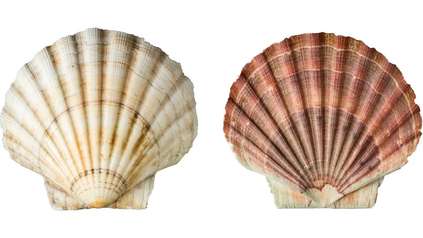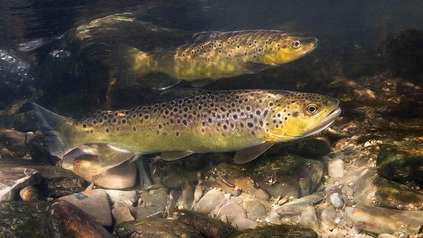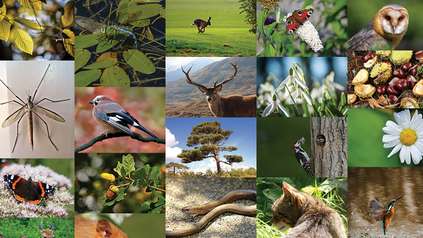Ambitious genomics project seeks to understand how aquatic species thrive together
The genetic codes of 1,000 aquatic species – representing 500 symbiotic partnerships – will be sequenced by the Wellcome Sanger Institute and its collaborators, in a mission to understand how these organisms have changed to depend on each other for survival.
The Aquatic Symbiosis Project, a new collaboration between the Wellcome Sanger Institute and the Gordon and Betty Moore Foundation, will empower researchers to answer important questions about the ecology and evolution of symbiosis – where two different species live in very close association – in marine and freshwater ecosystems, at a time when biodiversity is being lost at an alarming rate.
Symbiosis of marine animals – such as corals, sponges and many others – with microbes covers a spectrum of relationships, from temporary to lifelong and from mutually beneficial to exploitative. The relationships between corals and algae are mutually beneficial, with the algae receiving a home and the coral access to nutrients through photosynthesis. These coral collaborations are the foundations of hyper-diverse reef systems worldwide.
In contrast, parasites are symbionts that exploit their host, which provides a home and regular meals, but give nothing back and cause harm. Nearly one third of all described complex species are parasites, making this type of relationship hugely important.
Despite the complexity of symbiotic relationships, they have evolved independently countless times. But little is known about how symbiotic partners adapt to one another over time, how resilient these partnerships are and how they respond to disruption. The Aquatic Symbiosis Genomics project will bring all the tools of leading-edge genomics to bear on these questions.
“We are excited to work with the Sanger Institute to create essential research infrastructure and to expand the capacity of the scientific community to analyse genomic information. The Aquatic Symbiosis Genomics Project is intended to benefit the global community of scientists and ecologists who are working to understand and conserve ocean and freshwater biodiversity.”
Dr Sara Bender, program officer in the science program at the Gordon and Betty Moore Foundation
Based in the Tree of Life programme at the Sanger Institute, the Aquatic Symbiosis Genomics Project will create gold-standard genome sequences for around 1,000 marine and freshwater species that form around 500 symbiotic partnerships. Upon completion, the genomes will be made publicly available via an online data coordination platform run by EMBL’s European Bioinformatics Institute (EMBL-EBI).
Phase One of the Aquatic Symbiosis Genomics project has linked the Sanger research team with four international teams of collaborators* who bring their expert knowledge in symbiosis to the project. Each collaborator will submit samples for around 100 genomes. For Phase Two, there is an open call to aquatic symbiosis researchers to apply to collaborate with the Sanger Institute to sequence up to 100 aquatic symbiosis genomes each.
Genomic data from the project will allow scientists to investigate the evolutionary trajectory of symbiotic organisms, their place on the tree of life and how they live together. Access to genomic information will also be used to address some of the most urgent conservation challenges in our oceans, rivers and lakes. This includes phenomena such as coral bleaching, where higher ocean temperatures lead to corals losing their symbiotic algal partner after which they become sick or die. Mass bleaching events threaten the future of reef ecosystems worldwide. A greater understanding of the impact of this threat may allow researchers to develop strategies that could help reefs to survive.
“Surprisingly, only a handful of genomes have been generated for corals and even fewer for their algal symbionts. This new and exciting project aims to increase the number and quality of reference genomes available to the wider coral community of both the host corals and their symbiotic algae. A specific goal of the Coral Symbiosis Genome Project is to compare the genomes of the corals symbionts and those which are free-living, often found in reef sediments and the water column for example. From this we hope to identify key adaptations associated with symbiosis in this important group of microorganisms.”
Dr Michael Sweet, of the University of Derby and lead on one of the first four teams, the Coral Symbiosis Genome Project
“Symbiosis is a key part of the way the world works, and it has always fascinated me that organisms that might otherwise be predator and prey have evolved to cooperate to survive. The Aquatic Symbiosis Genomics project offers a unique opportunity for us to understand the origins, biology and future prospects of a huge range of symbioses. The visionary funding from the Gordon and Betty Moore Foundation, and the enthusiastic and open collaboration of our partners across the globe, promises to yield exciting new insights into this major part of Earth’s biodiversity.”
Professor Mark Blaxter, programme lead for the Tree of Life programme at the Sanger Institute and lead investigator of the Aquatic Symbiosis Genomics Project
More information
* Phase One collaborators are:
- Ute Hentschel Humeida (GEOMAR Helmholtz Centre for Ocean Research, Kiel, Germany)
- Jose Victor Lopez (Nova Southeastern University, Florida, USA)
- Michael Sweet (University of Derby, UK)
- John Archibald (Dalhousie University, Canada)
Funding:
The Aquatic Symbiosis Genomics Project is funded by Wellcome and the Gordon and Betty Moore Foundation.
Selected websites
The Gordon and Betty Moore Foundation
The Gordon and Betty Moore Foundation fosters path-breaking scientific discovery, environmental conservation, patient care improvements and preservation of the special character of the Bay Area. Visit Moore.org or follow @MooreFound on Twitter.
The Wellcome Sanger Institute
The Wellcome Sanger Institute is a world leading genomics research centre. We undertake large-scale research that forms the foundations of knowledge in biology and medicine. We are open and collaborative; our data, results, tools and technologies are shared across the globe to advance science. Our ambition is vast – we take on projects that are not possible anywhere else. We use the power of genome sequencing to understand and harness the information in DNA. Funded by Wellcome, we have the freedom and support to push the boundaries of genomics. Our findings are used to improve health and to understand life on Earth. Find out more at www.sanger.ac.uk or follow us on Twitter, Facebook, LinkedIn and on our Blog.
About Wellcome
Wellcome exists to improve health by helping great ideas to thrive. We support researchers, we take on big health challenges, we campaign for better science, and we help everyone get involved with science and health research. We are a politically and financially independent foundation. https://wellcome.org/





